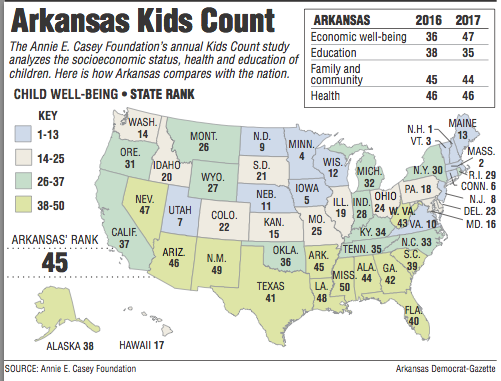A national children's advocacy group has ranked Arkansas one of the six worst states in the country for children, in part because of a high poverty rate that experts say has lingered since the 2008 recession.
Arkansas dropped from 44th to 45th in overall ranking among states, ahead of Arizona, Nevada, Louisiana, New Mexico and Mississippi. Since the report was first published in 1990, Mississippi has ranked last 20 times, according to the annual Kids Count report released by The Annie E. Casey Foundation, a Baltimore-based group that works to improve the futures of at-risk children.
The ranking is based on 16 factors across four categories from data collected in 2015: economic well-being, family and community, health, and education. Childhood poverty was a major contributor to Arkansas' fall in the rankings.
In 2015, about one in four, or 188,000, Arkansas children were living in poverty, according to the report.
"The reality is that we haven't made major progress on child poverty in many years," said Rich Huddleston, executive director of Arkansas Advocates for Children and Families, an advocacy group that provides information about the state's policies on children and families.
Nationally, the number of children living in poverty is dropping although the country has still not seen a full recovery after the 2008 recession, said Laura Speer, an associate director at the foundation who oversees the Kids Count project.
"We need to keep going in that positive direction," Speer said.
To set children up to land jobs one day that can help pull them out of poverty, improvements to their education are needed, Huddleston said.
The report showed that only about one in four eighth-grade Arkansans are proficient in math and one in three fourth-graders are proficient in reading, based on standards from the National Assessment of Educational Progress.
Math proficiency rates have been low for quite some time, and legislators often discuss ways to improve educational standards across the board, said Bruce Cozart, chairman of the House of Representatives Education Committee.
Huddleston's group advocates for more state money for a high-quality preschool experience, after-school and summer programs and more support for children who are in the welfare or juvenile justice systems.
"Because they [children living in poverty] don't have high-quality summer programs, they have to spend part of the year relearning what they learned last year," Huddleston said.
An interrupted education for teenagers who give birth also increases the risk of a life of poverty for the mother and her children, Speer said.
Even though the teen birthrate in Arkansas has dropped in past years, it is still ranked as the state with the most teenage pregnancies -- 3,677 in 2015, or 38 out of every 1,000 teens. The national average was 22 for every 1,000 teens, an all-time low in the United States.
"At the national level, we're at a historic low for teen births, and it continues to go down every year," Speer said. "I thought it would plateau by now, but it keeps dropping."
Arkansas is on par with this trend. In 2010, about 52 out of every 1,000 teens were having babies.
"We've gotten much better," Huddleston said. "The problem is that other states have gotten better at a faster rate."
There are strategies that work for decreasing teen birthrates, including encouraging high schoolers to wait to start having sex and teaching them how to use contraceptives, Speer said.
There are no legally mandated sex-education requirements in Arkansas.
While changes to sex education in Arkansas have been discussed, there is nothing concrete in the works, said Cozart, R-Hot Springs.
"I know that's an ongoing effort, but kids are kids," he said.
Health care coverage was a bright spot for Arkansas in the 2015 data, Huddleston said.
Only 5 percent of Arkansas children live without health insurance. The number of children who are insured is at an all-time high, according to the report.
These positive numbers are partially because of ARKids First, a program that provides health coverage for families with incomes too high for Medicaid that cannot afford private insurance.
Since ARKids launched in 2̶0̶0̶7̶ 1997*, Arkansas has seen a steady increase in the number of kids who have health care coverage. As many as one in five children did not have health insurance in the late 1990s.
Pending federal policies may threaten these improvements, Huddleston said.
Changes to the existing health care system and proposed budget cuts could spark "devastating results" for Arkansas children, he said.
"That's one of the really good things in this report -- progress with health care," Huddleston said. "What they do in D.C. really could impact that."
A Section on 06/13/2017
*CORRECTION: ARKids First, a program that provides health coverage for families that don’t qualify for Medicaid, launched in 1997. A previous version of this article about Arkansas’ national ranking for child well-being had an incorrect date.

